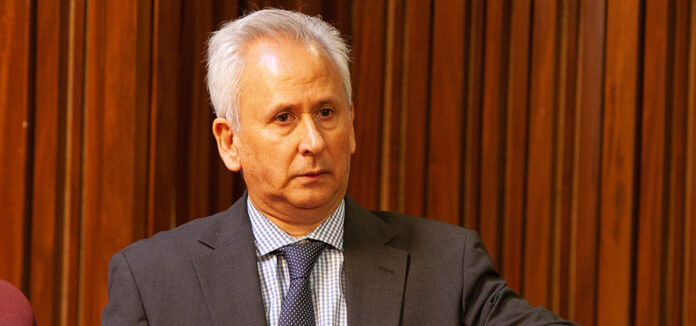Acting Minister of Police Firoz Cachalia has hit back at calls for him to apologise for remarks he made about KwaZulu-Natal police commissioner Lt-Gen Nhlanhla Mkhwanazi regarding the military-style uniform Mkhwanazi wore during his fiery July 6 media briefing.
Cachalia was responding to a question from uMkhonto weSizwe MP Vusi Shongwe at the Parliamentary Ad Hoc committee, saying there was no need for an apology because his comments were not meant to offend.
“I never said that he was not entitled to wear that uniform, I never said it was illegal. I can’t be requested to answer a question that doesn’t arise… There’s no need for me to apologise about something that was not intended badly, so I will not apologise.
Public discourse is a good outcome
“In fact I believe that the issue that I raised was an important one. I shared my initial impression with the public, in an open way, that’s what it means to have public discourse. If my comments have occasioned a public discourse, that’s a good thing,” said Cachalia.
He also pointed out that Mkhwanazi himself had not demanded any apology from him. And that he would know how to reach him if it is demanded.
Cachalia added that his remarks were not about questioning Mkhwanazi’s right to wear the regalia. But they were about the image it created when a police general appeared in public dressed as a soldier.
“I am not familiar with all the versions of military regalia and when they can be worn and when not. I understand that he is part of special ops. And I suppose the question for me was not whether he was entitled to wear the uniform, but the image of someone who’s dressed as a soldier. That’s how I see that, making a statement in public as he was,” Cachalia explained.
He said his response was a complex one that also recognised Mkhwanazi’s role and contribution.
SA’s liberation history
Reflecting on South Africa’s liberation history, Cachalia said the issue also touched on a long-standing principle. One about the balance between political leadership and armed structures.
“I might mention to you, apart from issues that are of constitutionality and so forth, you will recall actually that in a liberation movement this whole question of the relationship between the armed wing and the civilian leadership was always a question.
“We were very clear that the army was subject to the political leadership that was in charge. So, we didn’t have a tradition in our movement, in any way that I understand it – of militarism.”
He also raised concerns about former police minister Bheki Cele telling the committee that he has had engagement with alleged Big Five drug cartel member Vusimuzi “Cat” Matlala and having slept over at one of his apartments.



